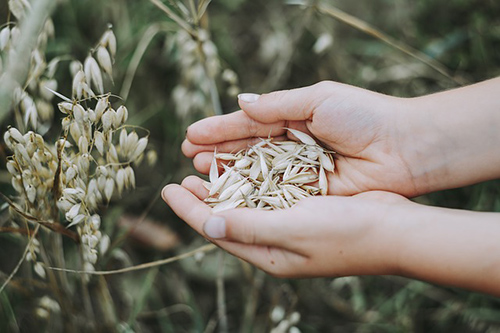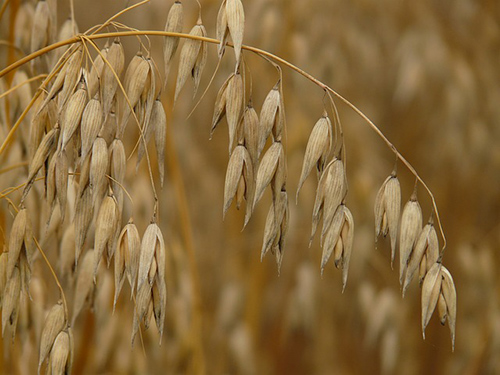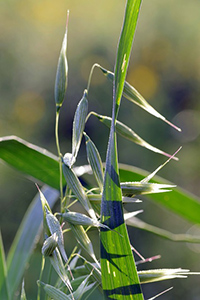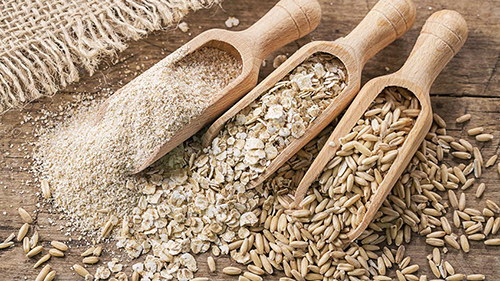Contents
Flakes prepared from the oat plant by pressing oats into ground grain are an integral food popular in Central and Northern Europe. Moreover, oats have stimulating effects on the nervous system.
Healing Properties

Oat grains contain about sixty to seventy percent starch and other sugars (carbohydrates), about 14% proteins, and about 7% lipids (fat). Among other substances, they contain a significant amount of lecithin, B vitamins, pantothenic acid, enzymes, minerals, mainly calcium and phosphorus, certain trace elements, and an alkaloid (avenine), which have balancing and invigorating effects on the nervous system.
The oat plant is very advisable in cases of depression, insomnia, and physical or nervous fatigue. People suffering from stress or sexual impotence, students—mainly during exams—athletes and breastfeeding women will find that oats from the oat plant are an excellent medicine food. Because of its practical use in poor digestion is also suitable for convalescents and those experiencing gastritis, colitis, and other digestive problems.
The bran of the oat plant contains silicon and vitamins A and B. It possesses soothing effects on the nervous system when taken orally as an infusion and used externally during bathing. Some research has demonstrated that oat bran reduces cholesterol in the blood. This decrease only affects the so-called “noxious” cholesterol (LDL). Still, it does not influence the level of “good” or protective cholesterol (HDL), which, as recently discovered, helps avoid arteriosclerosis.
This action of oat bran on the cholesterol level is standard for all products containing vegetal bran, especially when the bran is soluble, for example, apples.

Oat Plant Scientific Facts
- Scientific name: Avena sativa L.
- French: Avoine.
- Spanish: Avena.
- Environment: Originally from southern Europe, its cultivation has spread to all five continents.
- Description: Oat is an annual plant of the Gramineae family that grows up to 1 m in height. Its flowers and grains are grouped in pairs in its ears.
- Parts of the plant used medicinally: Bran and grains.
Oats and Cholesterol

Dr. James Anderson of the University of Kentucky was working with diabetic patients to find a grain that efficiently controlled blood sugar levels. Dr. Anderson found that when these patients ate oat flour, not only did their blood sugar levels improve, but so did their cholesterol.
When studying the issue in detail, he concluded that the agent causing these decreases was the bran in oat flakes. The soluble bran that makes oat bran acts by absorbing bile acids in the intestine and expelling them with defecation.
Bile acids are formed in the liver from the blood cholesterol and poured into the intestine with the bile. Most of the bile is usually reabsorbed in the ileum (the third portion of the small intestine), passing again to the blood and serving as an essential element in the production of cholesterol.
Oat bran forces the liver to produce more bile acids, which are essential in digestive processes, by absorbing and eliminating them along with feces. Thus, the liver must use the cholesterol that blood contains, which decreases its level. Hence, consuming whole oat flakes (with bran) is an excellent way to reduce cholesterol.
Oat Straw
Oat straw tea is beneficial and recommended for kidney and chest ailments. It acts as a restorative nerve tonic and an antidepressant. The plant also increases sweating, which helps to reduce fevers. For cases of bed-wetting, oat straw tea is an excellent remedy for children. It is also perfect for treating stomach problems, nervous diseases, weak muscles from nerve exhaustion, occipital headaches, heart palpitations, epilepsy, stress, depression, colic, and insomnia.
In external applications, oat straw tea is used in Europe for various baths and, when utilized regularly, helps treat several ailments. Adding a gallon of tea to a full bath is good for kidney and stone problems, gout, liver ailments, lumbago, paralysis, and rheumatic pains. A sitz bath can help treat bed-wetting, intestinal colic, bladder, and abdominal problems. A local wash treats eye problems, chilblains, wounds, flaky skin, frostbite, and skin diseases.
An extract from fresh oat berries picked when the milky substance is in the grain is excellent for body and brain functions. It is a specific treatment for weak nerves and can be utilized as a tonic for the nerves. It can overcome most diseases due to physical exhaustion and nervous issues, including uterine and ovarian disorders.
Infusion: Steep for five to fifteen minutes and take six ounces three times daily. Tincture: Take thirty to sixty drops three times daily. Fluid Extract: Take one teaspoon three times daily. Powder: Take up to ten #0 capsules (60 grains) thrice daily.

How to use the Oat Plant
- Flakes (pressed seeds) cooked with milk or vegetable broth.
- Infusion. Prepared with a tablespoon of oat bran per cup. Drink two or three a day.
- Relaxing bath. To achieve adequate relaxation, oat infusion may also be added to bathwater in a proportion of one liter per middle-sized bath.
DISCLAIMER: All content on this website is presented solely for educational and informational objectives. Do not rely on the information provided as a replacement for advice, diagnosis, or treatment from a qualified medical expert. If you are pregnant, nursing, or have any preexisting medical concerns, talk to your doctor before using any herbal or natural medicines.
REFERENCES
- George D. Pamplona-Roger, M.D. “Encyclopedia of Medicinal Plants.” George D. Pamplona-Roger, M.D. Encyclopedia of Medicinal Plants. Ed. Francesc X. Gelabert. Vols. 1 San Fernando de Henares: Editorial Safeliz, 2000. 150, 151. Print.
- Vance Ferrell Harold M. Cherne, M.D. The Natural Remedies Encyclopedia [Book]. – Altamont, TN: Harvestime Books, 2010. – Vol. Seventh Edition: 7: pp. 170, 171.
- The Health Benefits of Oats (Avena Sativa): https://www.verywellhealth.com/oats-avena-sativa-4707610
- WebMD: https://www.webmd.com/vitamins/ai/ingredientmono-814/oats
